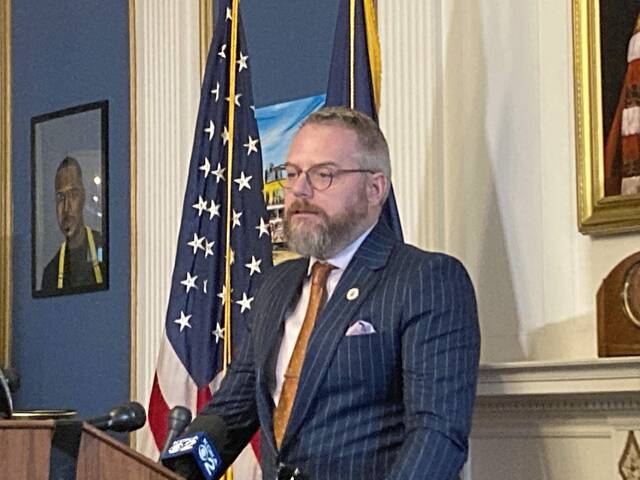An internal probe spurred by misuse of City of Pittsburgh-issued credit cards revealed “honest mistakes” by employees and resulted in little discipline and few policy changes, a top city official said Wednesday.
The three-month investigation, released by Jake Pawlak, the city’s Director of the Office of Management and Budget, found some improper use of the city’s credit cards in the Department of Parks and Recreation but no widespread problems or illicit activity.
Even as Pawlak released a six-page summary of the report that marked the conclusion of the probe, it was disclosed that the Allegheny County District Attorney’s Office has launched its own investigation and executed a search warrant on the city.
An affidavit supporting the search warrant alleged that a former contractor was “improperly” paid with a municipal credit card and criticized city officials for not cooperating with the DA’s office.
The affidavit also said that the DA’s office was initially denied access to materials it sought from the city’s Office of Municipal Investigations, which handled the internal probe, and that records maintained by the office “are evidence of criminal activity.”
It was not clear whether the reference to criminal activity was general or specific to the current situation.
The spending scandal underlying the probe saw Department of Parks and Recreation Director Kathryn Vargas authorize more than $20,000 in credit card payments to a contractor who had been fired from another city position.
Some City Council members and Controller Rachael Heisler raised questions about how city-issued credit cards, often referred to as “p-cards,” were used and monitored.
Pawlak said the violations that were uncovered did not warrant firing Vargas or revamping the way the city uses its credit cards.
“The Gainey administration believes hardworking, exemplary employees who make honest mistakes should have an opportunity to learn from those mistakes and do better,” Pawlak said during a press conference in the mayor’s office.
Instead, the internal probe required that all city employees who have a city credit card or approve expenses on city credit cards be retrained earlier this year in addition to training they receive each January. That process has already been completed, Pawlak said.
The Department of Parks and Recreation credit card will be subject to additional approvals from the Office of Management and Budget for a year.
The city has about 70 p-cards in use, Pawlak said, and there will be no major changes to the way they are used.
Charland unhappy
Councilman Bob Charland, D-South Side, expressed frustration on several fronts and was critical of the probe.
“As the member most critical of this administration’s careless handling of p-card policies, I am deeply dissatisfied with their failure to inform all council members about recent findings related to an internal investigation of these p-cards,” Charland said in a statement.
He complained about what he said was a failure to brief council members on the findings, update them during the course of the investigation or communicate changes to the way the credit cards are used.
Charland also questioned whether the Office of Municipal Investigations could conduct an impartial review, given that the office reports to an official within the Office of Management and Budget.
Charland has voted against all p-card payments since the scandal surfaced in May.
“If no changes have been implemented and communicated, the current system remains vulnerable to the same abuses as before,” Charland said, adding that he welcomed an investigation from the district attorney’s office.
Heisler also expressed lingering concerns and said she still had questions as her audit of p-card practices continues.
A scandal unfolds
In May, Heisler voiced concerns about how the parks department was paying a contractor on city credit cards. The payments totaled approximately $23,000 over about a year.
City rules forbid using the credit cards to pay professional contractors.
Initially, Heisler and other city leaders felt that paying Mario Ashkar, a contractor who helped coordinate farmers markets, on city credit cards violated the policy.
The city’s internal probe, however, determined Ashkar was conducting “nonprofessional service” and could be paid on p-cards for such work.
Instead, Pawlak said, the investigation — which was conducted by the Office of Municipal Investigations, which probes alleged employee misconduct — raised issues that the payments violated other city policies that govern how much the city can spend on a single vendor through credit cards.
Heisler remains skeptical, and said in a statement that “there is substantial ambiguity as to what constitutes a ‘professional service’ within the department and across the city.”
The controller also pointed to a lack of documentation for payments and the absence of a written agreement about the start or end dates of Ashkar’s work.
Ashkar received payments last year beyond the $10,000 cap for how much a single vendor can be paid on city credit cards, Pawlak said, so he should have been brought on as a city employee instead of a contractor.
The investigation also determined Vargas should have consulted with the city’s human resources, law or budget offices to create a job description and salary for his duties because of the number of hours he worked and the scope of his position.
Failing to properly hire him as an employee, and authorizing payments beyond the permitted limit, were violations, Pawlak said.
What did Vargas know?
Some city leaders also had raised concerns about the fact that Ashkar had previously been fired from a role in the city’s Department of Public Safety.
Ashkar, 36, of North Side, was then rehired less than a year later in the Department of Parks and Recreation.
Emails obtained by TribLive through a Right-to-Know request showed Vargas knew about Ashkar’s previous termination before hiring him.
Those documents also confirmed Vargas was the one to authorize payments to Ashkar on the credit card.
The report released Wednesday said that Vargas told investigators she believed Ashkar had been terminated previously for tardiness at work and not being a good fit for the position.
“I felt that it was a way for management to not deal with their own deficiencies in creating a supportive work culture,” Vargas said, according to the report.
The city has not said why it fired him.
Pawlak said Vargas felt Ashkar would be a valuable asset to the farmers markets. The report indicated Vargas and Ashkar had no prior relationship outside of their work with the city.
Pawlak said no one else in the administration pressured Vargas to rehire Ashkar. That question was not part of the Office of Municipal Investigations probe.
Vargas did not immediately respond to a request for comment on the investigation’s findings.
The investigation report summary suggested that during the hiring process, the Office of Municipal Investigations search its database for any problems with people who had previously worked for the city.
Such a search would not, however, uncover any disciplinary records housed internally within a city department.
Tweaks to p-card use
The problems around Ashkar’s payments came to light after he was charged with an unrelated crime.
Records obtained by TribLive showed Ashkar’s final invoice to the city — which officials reluctantly paid after discovering the problems surrounding his payments — appeared to be altered in early May, after he was charged with ethnic intimidation and criminal mischief.
On May 1, Ashkar submitted an invoice totaling $1,440. Two days later, he emailed Vargas an updated invoice totaling $1,200.
The first invoice included 12 hours of work each week for four weeks in April, ending April 28. The revised invoice removed work conducted April 24 through April 28, but added four hours of work to the previous week.
Pawlak said Ashkar had been fired from his position with city farmers markets before he went to work at one final event the week of April 24 through April 28.
Vargas told Pawlak to remove those hours from his invoice since he had already been fired, Pawlak said.
Pawlak could not explain why hours were added to the previous week in the revised invoice, and Heisler indicated that she was not taking the city’s explanation at face value.
Pawlak said his department is tweaking the way it reviews p-card expenses.
Previously, he said, there was a focus on ensuring no one credit card statement showed violations of city p-card policies.
Now, Pawlak said, they’re focusing more broadly to ensure there aren’t repeat payments that may exceed annual limits or indicate a vendor should have a different type of contract with the city or be hired as an employee.
Friction with the DA’s office
On Wednesday afternoon, the district attorney’s office released the search warrant it served a day earlier. The paperwork reveals friction between Zappala’s people and city officials.
The affidavit attached to the search warrant alleges that city Solicitor Krysia Kubiak did not cooperate with the DA’s investigation.
Download PDFAccording to the affidavit, Deputy District Attorney Jon Pittman requested an investigative file from the Office of Municipal Investigations on Aug. 6 but was told by Erin Bruni, an investigator there, that he needed permission from Kubiak’s office.
Pittman, however, noted that the investigations’ office has shared files numerous times without the solicitor’s permission.
Pittman left Kubiak a message, but did not receive a return call.
On Aug. 19, after repeated attempts to meet with Kubiak, Pittman and Kevin Flanigan, a DA’s detective who is also a certified public accountant, spoke to her.
She told them that the file they sought couldn’t be be turned over, the affidavit said, and that the city “could be held liable for turning over the file.”
Kubiak said the file involved an internal policy violation and was related to personnel matters.
Kubiak questioned Pittman and Flanigan multiple times about who filed a complaint with the DA’s office and questioned why law enforcement was not involved.
She told them that the DA’s office would need to use a subpoena or a search warrant if they wanted the file, according to the affidavit.
The DA’s search warrant was served on Bruni on Tuesday morning.
Zappala’s investigators seized an investigative file, emails, reports, a 32-gigabyte drive and the city’s final internal report.
In applying for the warrant, Flanigan wrote that he was seeking the investigative file related to p-card payments to Ashkar “and any investigative file associated with the City of Pittsburgh’s use of all purchasing cards during the same time period.”
According to the affidavit, Flanigan was assigned to the investigation on May 22.
A week later, the DA’s office sent a note to the city controller’s office seeking records regarding the use of city credit cards.
On Aug. 6, the affidavit said, Flanigan received a thumb drive in an envelope that said it was from the controller’s office.
The thumb drive included a 1099 tax form for Ashkar, a document showing a $1,320 check to Ashkar issued July 21, 2023; and 11 invoices from Ashkar to the city for work associated with farmer’s market and their PayPal payments to an account titled “Princess Jafar,” which were approved by Vargas.
It also contained emails between the controller, the solicitor, City Council, Office of Management and Budget, City of Pittsburgh administration and the Ethics Hearing Board; Excel spreadsheets; and a May 28 letter from Heisler and council on the p-card issue, which noted a lack of cooperation.
The city handed over the Office of Municipal Investigations materials in response, Pawlak said.
Pawlak acknowledged the district attorney had asked for those records previously.
Pawlak said Pittsburgh police have not been involved in investigating the use of the city credit cards.
“We feel there’s ultimately no basis of a criminal investigation,” Pawlak said.
The controller’s probe
Heisler, as the city’s independent fiscal watchdog, had promised to launch her own investigation.
She was not immediately available Wednesday to discuss the findings of the city’s internal investigation or the status of her own inquiry.
Heisler has criticized Mayor Ed Gainey for refusing to cooperate with her requests for records. Gainey instead opted to cooperate only with the Office of Municipal Investigations.
The office reports to a top Gainey official — Lisa Frank, Pittsburgh’s chief operating and administrative officer.
The summary Office of Municipal Investigations report — which was released publicly Wednesday — will go into Vargas’ personnel file, Pawlak said.
Pawlak said the city does not typically release the office’s findings but determined that it was appropriate to do so in this instance because of the public interest in this case.
Olga George, a spokeswoman for Gainey, said the city did not release the full report to protect the confidentiality of employees who cooperated with the investigation.
Staff writer Paula Reed Ward contributed to this report.








